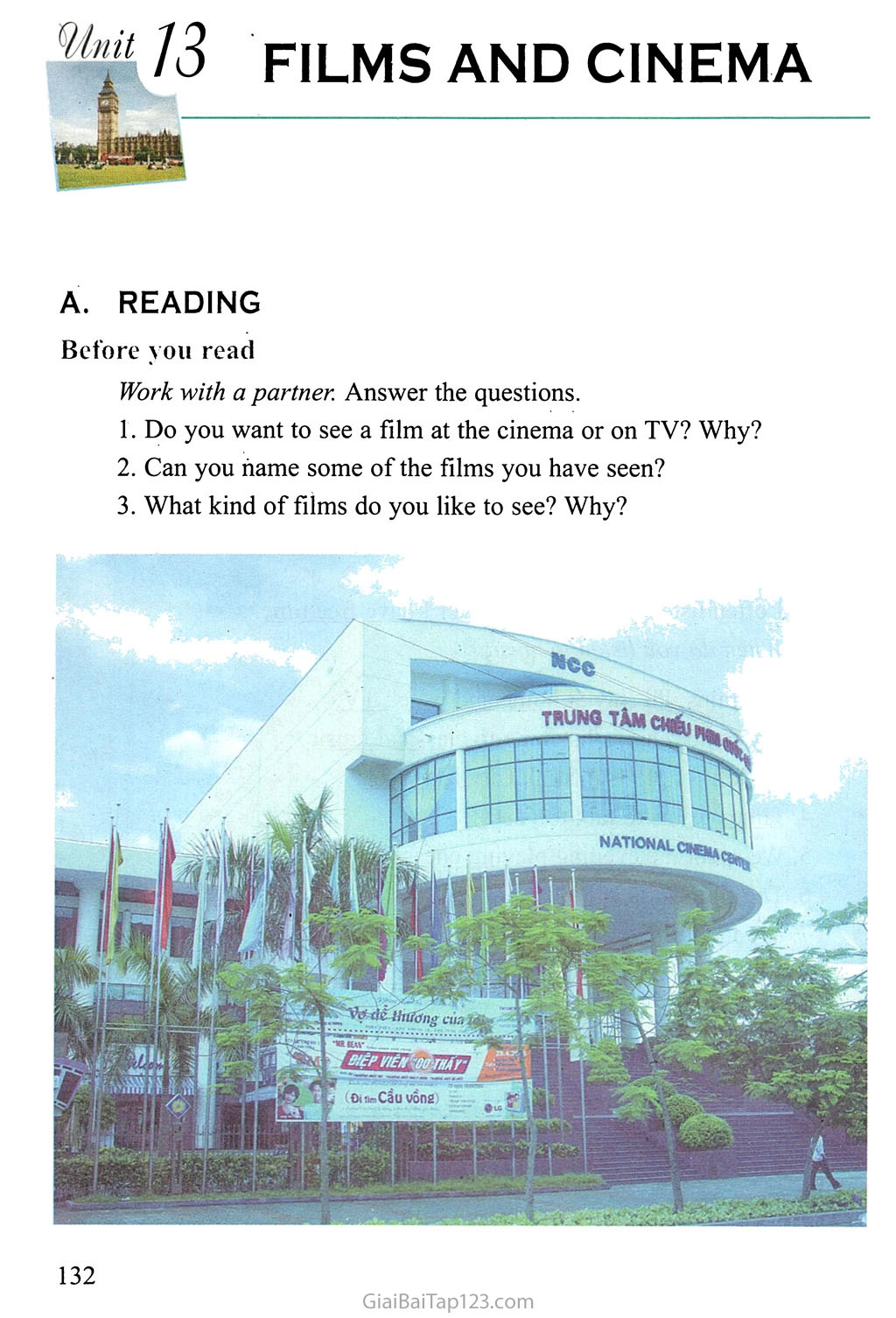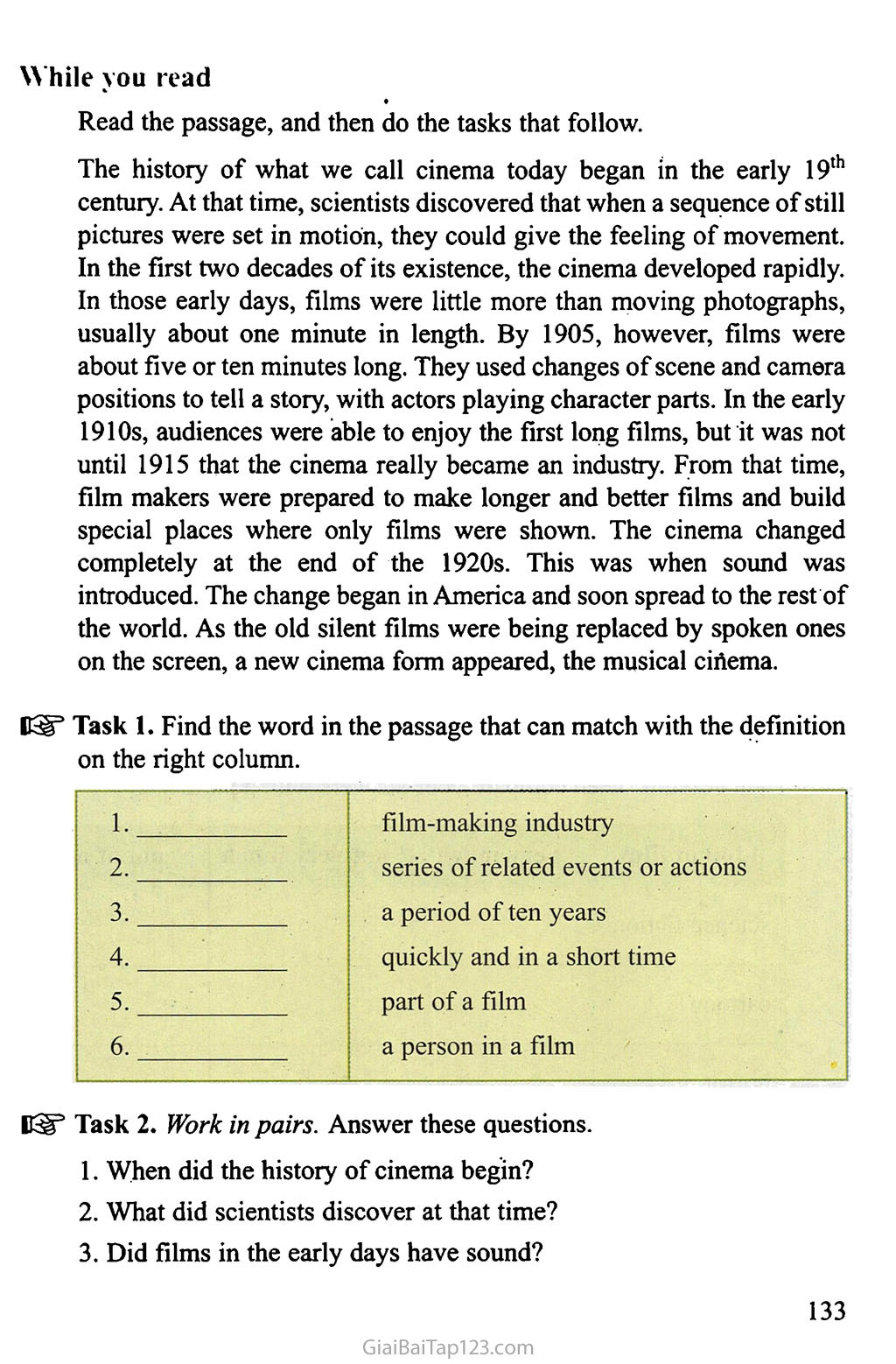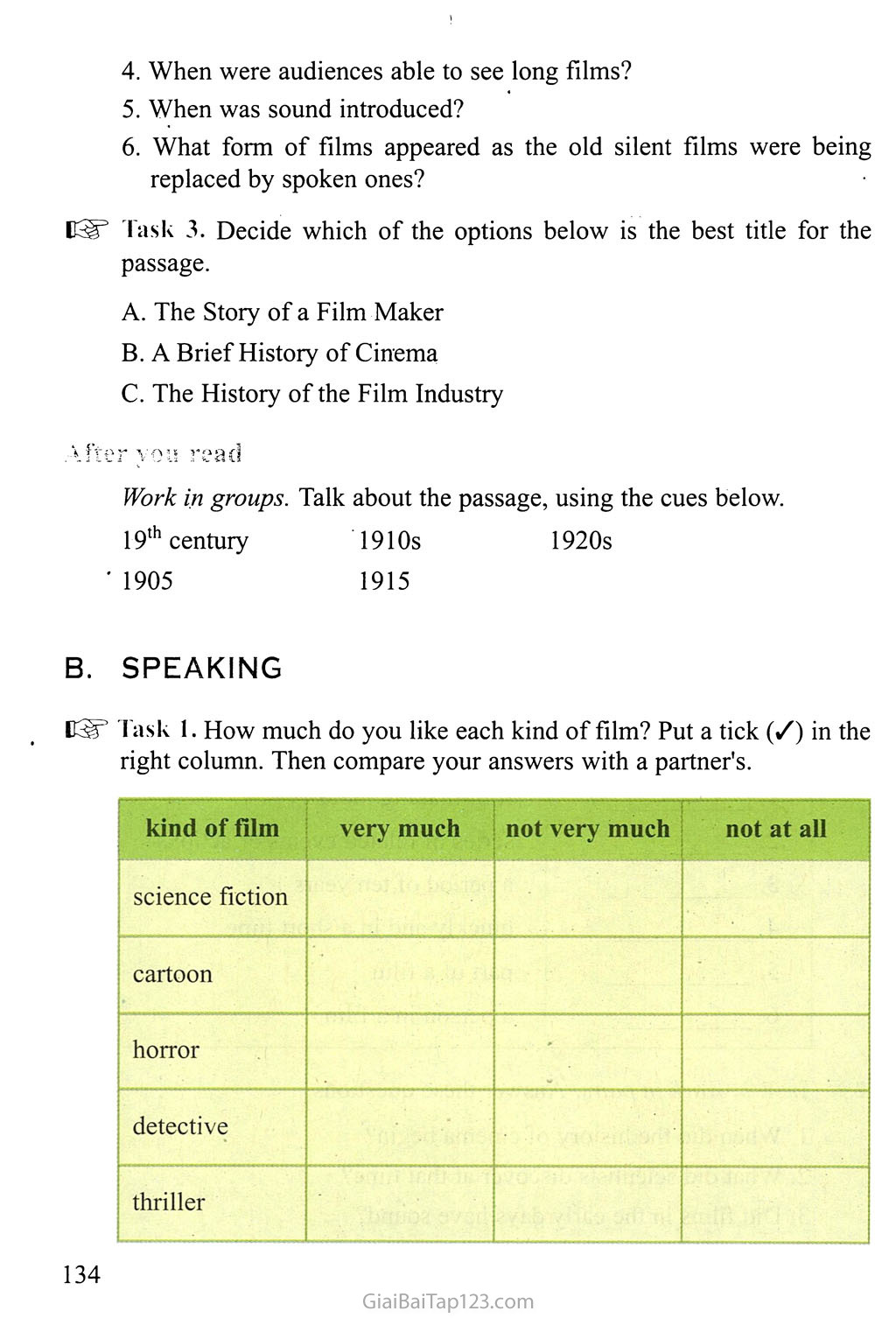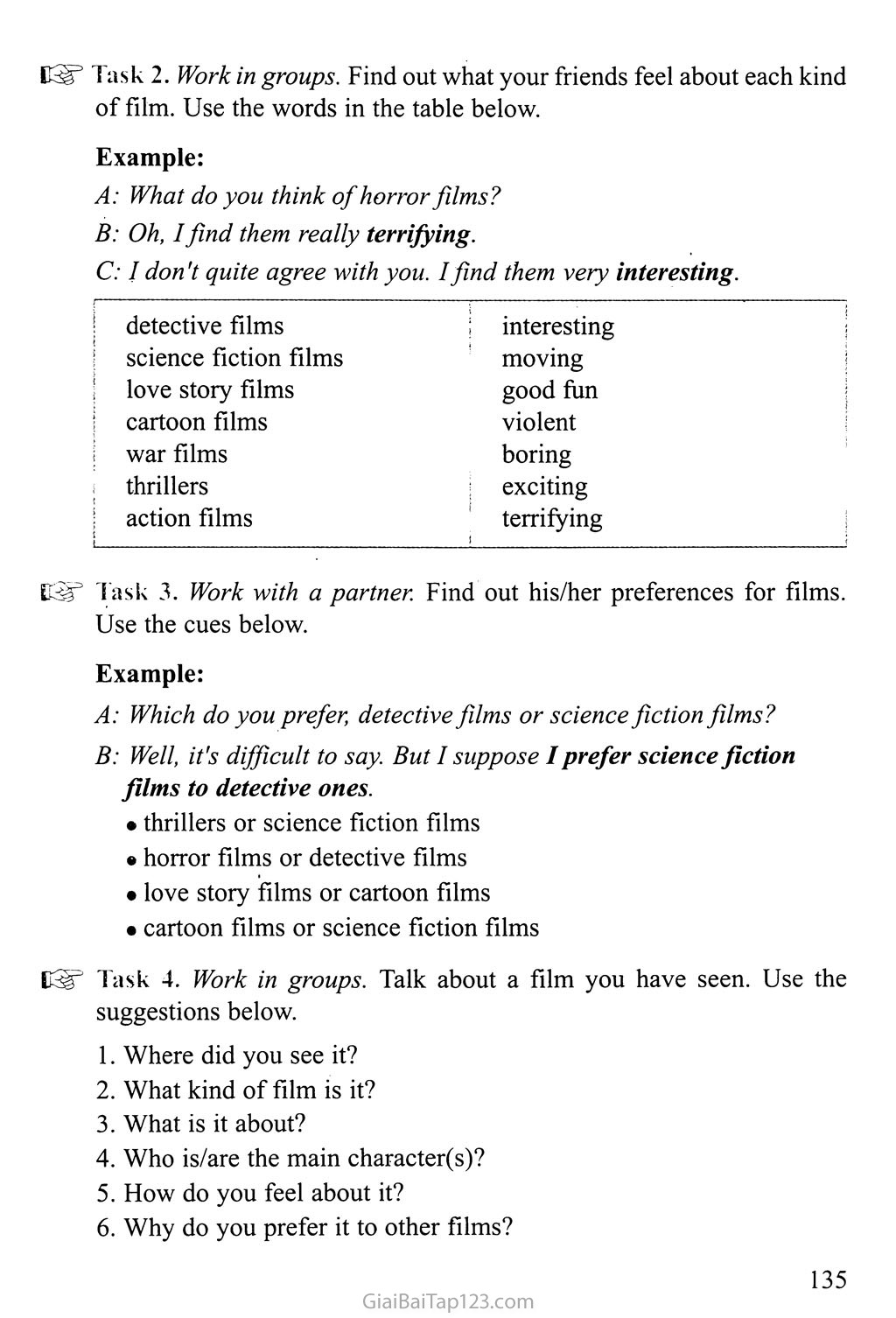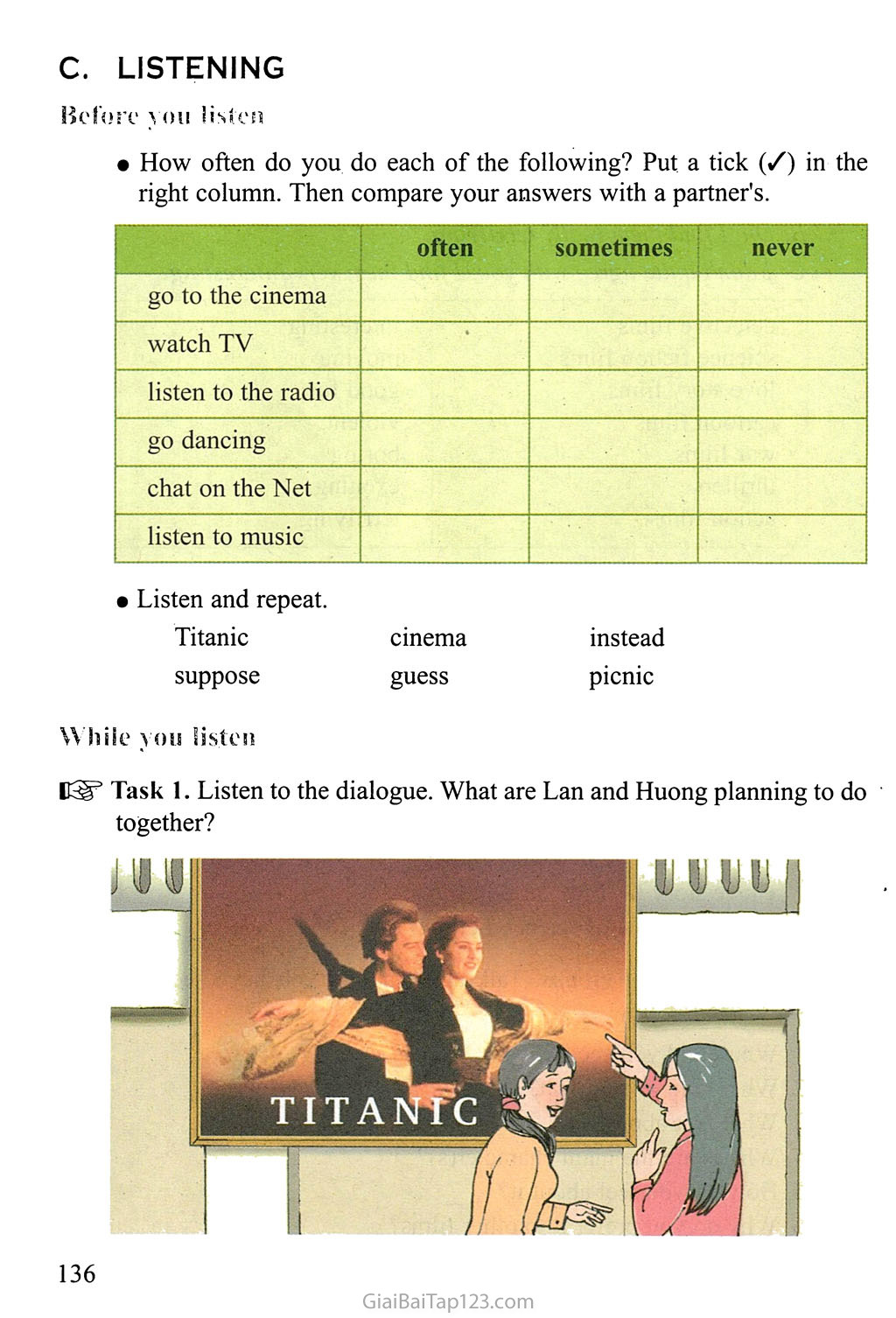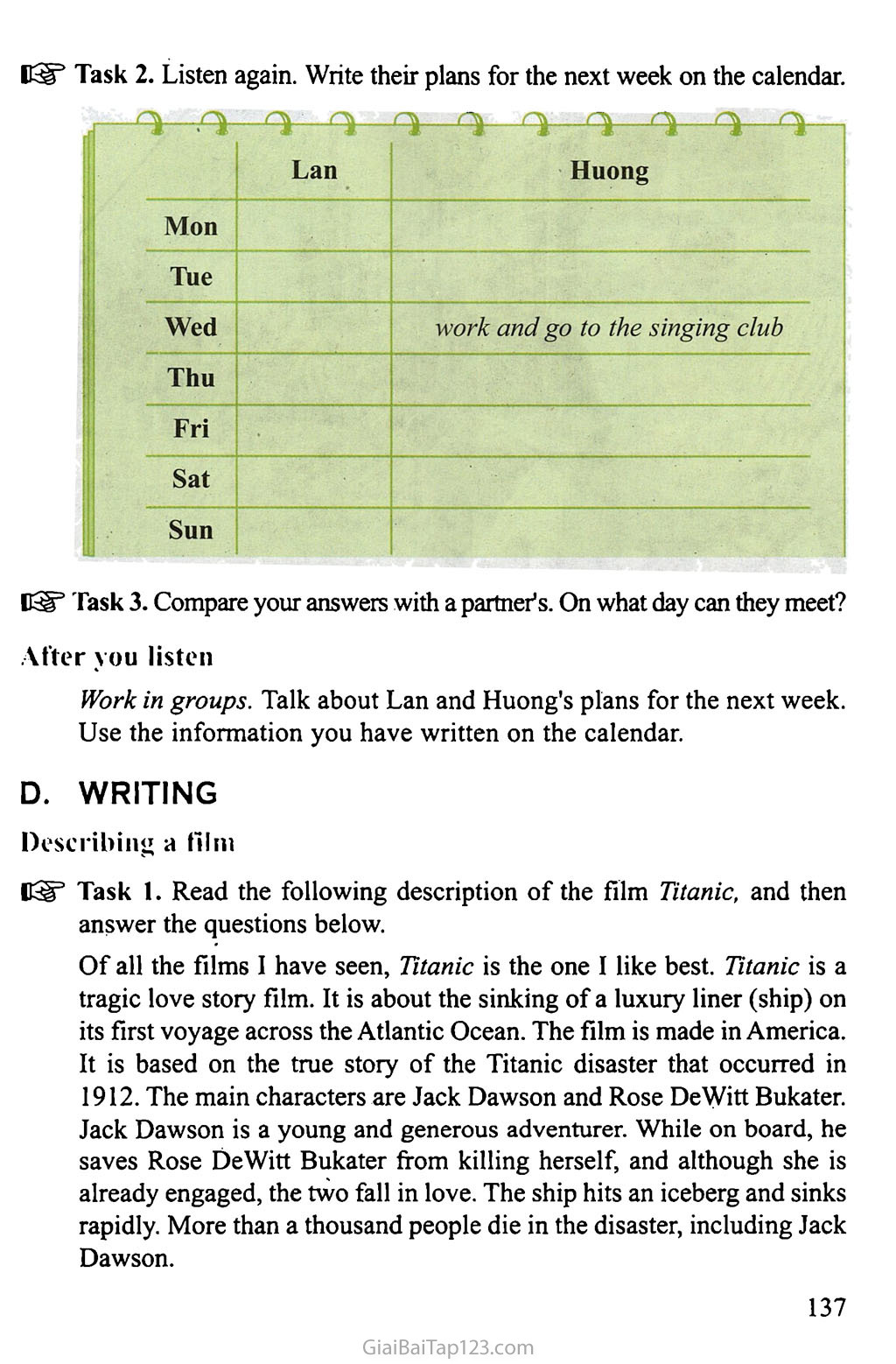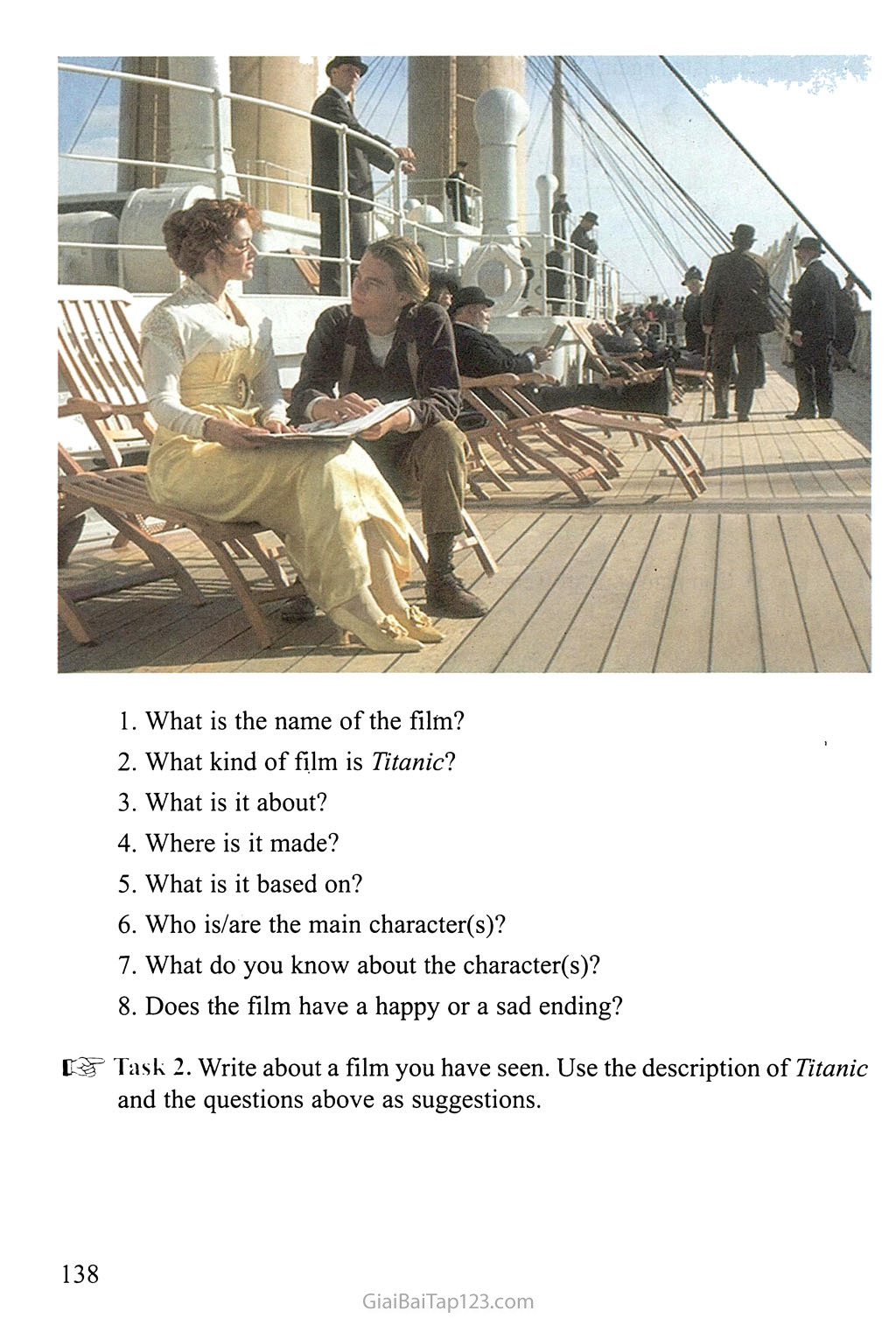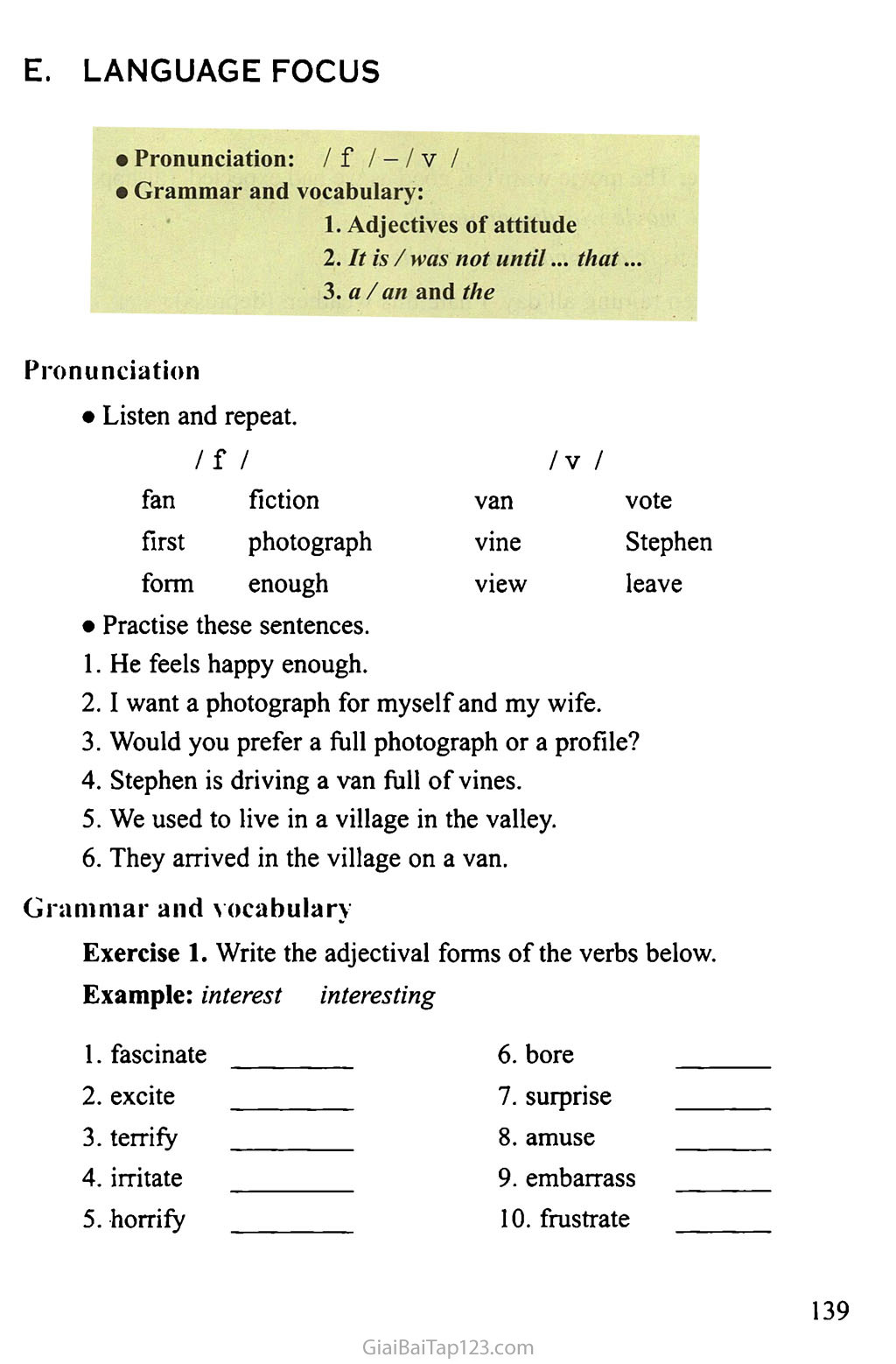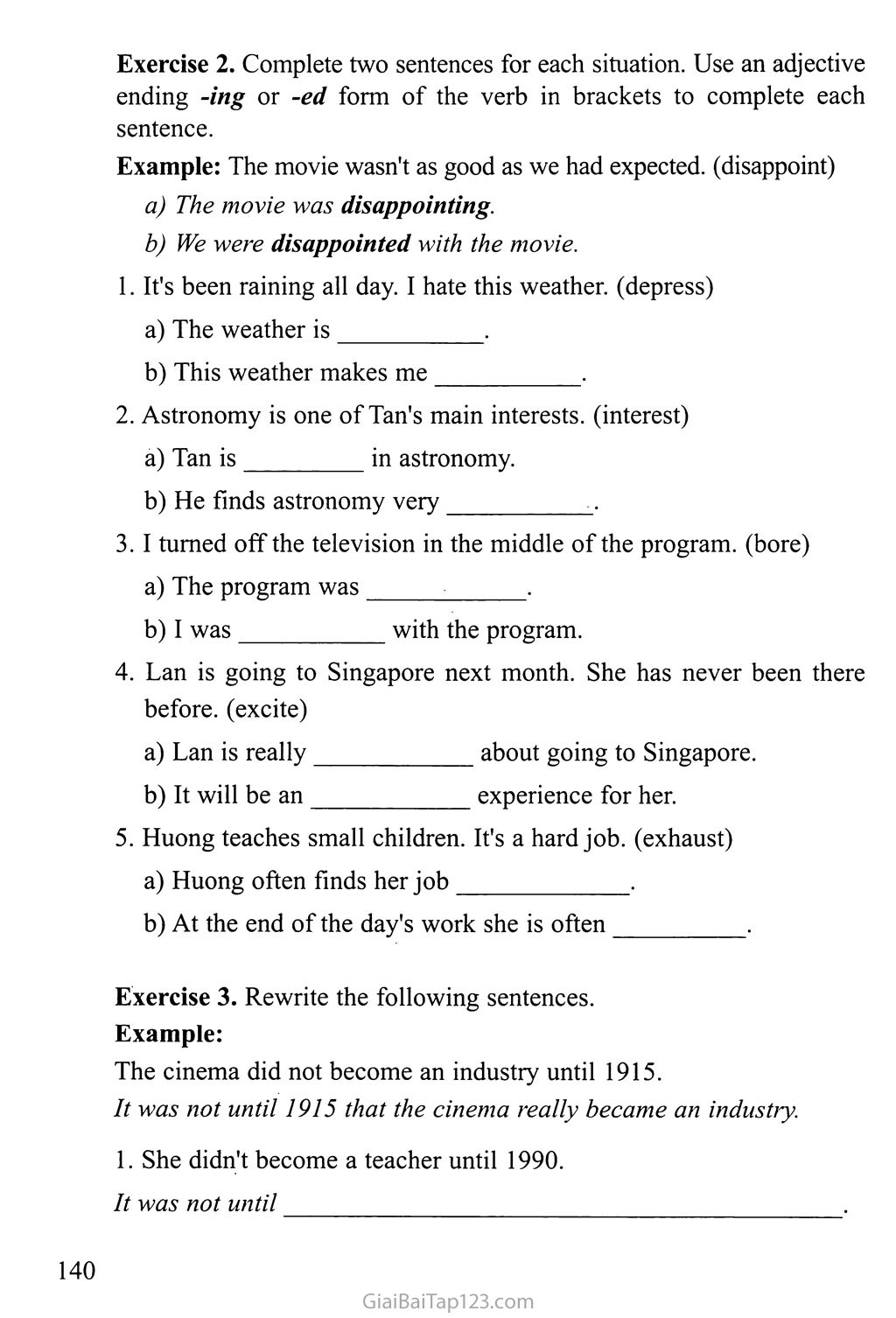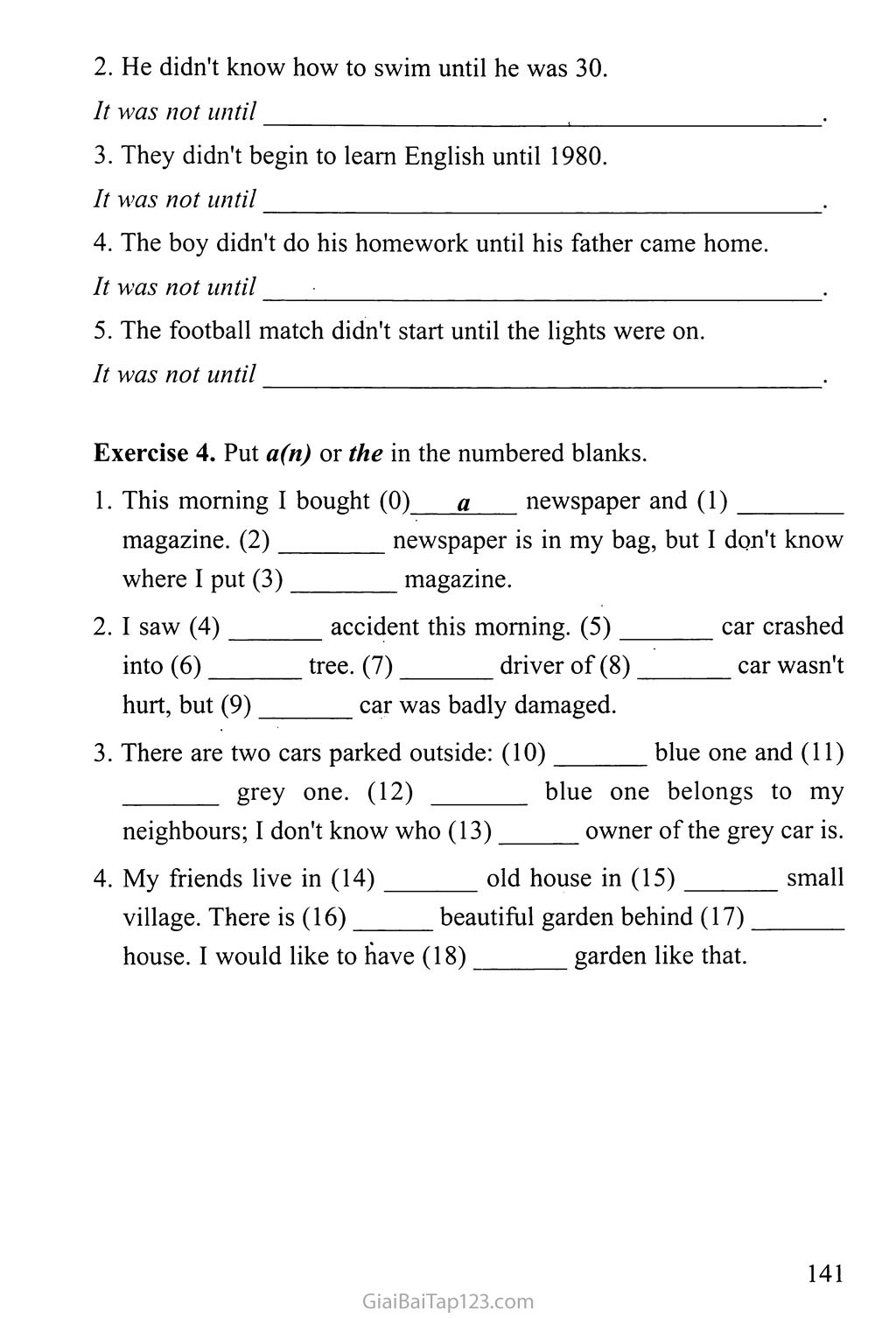SGK Tiếng Anh 10 - Unit 13: FILMS AND CINEMA
FILMS AND CINEMA A. READING Before you read Work with a partner. Answer the questions. Do you want to see a film at the cinema or on TV? Why? Can you name some of the films you have seen? What kind of films do you like to see? Why? While you read ♦ Read the passage, and then do the tasks that follow. The history of what we call cinema today began in the early 19th century. At that time, scientists discovered that when a sequence of still pictures were set in motion, they could give the feeling of movement. In the first two decades of its existence, the cinema developed rapidly. In those early days, films were little more than moving photographs, usually about one minute in length. By 1905, however, films were about five or ten minutes long. They used changes of scene and camera positions to tell a story, with actors playing character parts. In the early 1910s, audiences were able to enjoy the first long films, but it was not until 1915 that the cinema really became an industry. From that time, film makers were prepared to make longer and better films and build special places where only films were shown. The cinema changed completely at the end of the 1920s. This was when sound was introduced. The change began in America and soon spread to the rest of the world. As the old silent films were being replaced by spoken ones on the screen, a new cinema form appeared, the musical cinema. CSsT Task 1. Find the word in the passage that can match with the definition on the right column. 1. film-making industry 2. series of related events or actions 3. a period of ten years 4. quickly and in a short time 5. part of a film 6. a person in a film dr Task 2. Work in pairs. Answer these questions. When did the history of cinema begin? What did scientists discover at that time? Did films in the early days have sound? When were audiences able to see long films? When was sound introduced? What form of films appeared as the old silent films were being replaced by spoken ones? ESC Task 3. Decide which of the options below is the best title for the passage. The Story of a Film Maker A Brief History of Cinema c. The History of the Film Industry After you read Work in groups. Talk about the passage, using the cues below. 19th century 1910s 1920s ' 1905 1915 B. SPEAKING cw Task 1. How much do you like each kind of film? Put a tick (/) in the right column. Then compare your answers with a partner's. kind of film very much not very much not at all science fiction cartoon horror detective thriller CdgT Task 2. Work in groups. Find out what your friends feel about each kind of fdm. Use the words in the table below. Example: A: What do you think of horror films? B: Oh, I find them really terrifying. C: I don't quite agree with you. I find them very interesting. detective films interesting science fiction films moving love story films good fun cartoon films violent war films boring thrillers exciting action films terrifying KIT Task 3. Work with a partner. Find out his/her preferences for films. Use the cues below. Example: A: Which do you prefer, detective films or science fiction films? B: Well, it's difficult to say. But I suppose I prefer science fiction films to detective ones. thrillers or science fiction films horror films or detective films love story films or cartoon films cartoon films or science fiction films E<ir Task 4. Work in groups. Talk about a film you have seen. Use the suggestions below. Where did you see it? What kind of film is it? What is it about? Who is/are the main character(s)? How do you feel about it? Why do you prefer it to other films? c. LISTENING Before you listen • How often do you do each of the following? Put a tick (/) in the right column. Then compare your answers with a partner's. often sometimes . • never go to the cinema watch TV * listen to the radio go dancing chat on the Net listen to music • Listen and repeat. Titanic cinema instead suppose guess picnic While you listen KB" Task 1. Listen to the dialogue. What are Lan and Huong planning to do together? IW Task 2. Listen again. Write their plans for the next week on the calendar. a—.r a—— Lan a a a a ' a "a" a Huong . .. .... .... . . ■ Mon Tue Wed work and go to the singing club Thu • Fri Sat • Sun ; ■ " . • 1 - ■ 1 Kễ3 Task 3. Compare your answers with a partner's. On what day can they meet? After you listen Work in groups. Talk about Lan and Huong's plans for the next week. Use the information you have written on the calendar. D. WRITING Describing a film IdT Task 1. Read the following description of the film Titanic, and then answer the questions below. Of all the films I have seen, Titanic is the one I like best. Titanic is a tragic love story film. It is about the sinking of a luxury liner (ship) on its first voyage across the Atlantic Ocean. The film is made in America. It is based on the true story of the Titanic disaster that occurred in 1912. The main characters are Jack Dawson and Rose DeWitt Bukater. Jack Dawson is a young and generous adventurer. While on board, he saves Rose DeWitt Bukater from killing herself, and although she is already engaged, the two fall in love. The ship hits an iceberg and sinks rapidly. More than a thousand people die in the disaster, including Jack Dawson. 1. 2. 3. 4. 5. 6. 7. 8. What is the name of the film? What kind of film is Titanic? What is it about? Where is it made? What is it based on? Who is/are the main character(s)? What do you know about the character(s)? Does the film have a happy or a sad ending? imu Task 2. Write about a film you have seen. Use the description of Titanic and the questions above as suggestions. E. LANGUAGE FOCUS Pronunciation: / f / — / V / Grammar and vocabulary: Adjectives of attitude It is / yvas not until... that... a / an and the Pronunciation • Listen and repeat. / f / /V / fan fiction van vote first photograph vine Stephen form enough view leave • Practise these sentences. He feels happy enough. I want a photograph for myself and my wife. Would you prefer a full photograph or a profile? Stephen is driving a van full of vines. We used to live in a village in the valley. They arrived in the village on a van. Grammar and vocabulary Exercise 1. Write the adjectival forms of the verbs below. Example: interest interesting 1. 2. 3. 4. 5. fascinate excite terrify irritate horrify bore surprise amuse embarrass frustrate Exercise 2. Complete two sentences for each situation. Use an adjective ending -ing or -ed form of the verb in brackets to complete each sentence. Example: The movie wasn't as good as we had expected, (disappoint) The movie was disappointing. We were disappointed with the movie. It's been raining all day. I hate this weather, (depress) The weather is . This weather makes me . Astronomy is one of Tan's main interests, (interest) Tan is in astronomy. He finds astronomy very I turned off the television in the middle of the program, (bore) The program was . I was with the program. Lan is going to Singapore next month. She has never been there before, (excite) Lan is really about going to Singapore. It will be an experience for her. Huong teaches small children. It's a hard job. (exhaust) Huong often finds her job . At the end of the day's work she is often . Exercise 3. Rewrite the following sentences. Example: The cinema did not become an industry until 1915. It was not until 1915 that the cinema really became an industry. She didn't become a teacher until 1990. It was not until . He didn't know how to swim until he was 30. The football match didn't start until the lights were on. It was not until Exercise 4. Put a(n) or the in the numbered blanks. This morning I bought (0) a newspaper and (1) magazine. (2) newspaper is in my bag, but I don't know where I put (3) magazine. I saw (4) accident this morning. (5) car crashed into (6) tree. (7) driver of (8) car wasn't hurt, but (9) car was badly damaged. There are two cars parked outside: (10) blue one and (11) grey one. (12) blue one belongs to my neighbours; I don't know who (13) owner of the grey car is. My friends live in (14) old house in (15) small village. There is (16) beautiful garden behind (17) house. I would like to have (18) garden like that.

